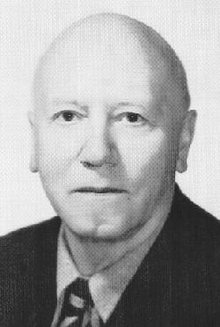CD Broad
CD Broad , actually Charlie Dunbar Broad , (born December 30, 1887 in Harlesden , Middlesex , † March 11, 1971 ) was a British philosopher .
Life
Charlie Dunbar Broad (of his name hated and therefore operated under the name CD Broad) went after attending a preparatory school in 1900 at the Dulwich College and 1906 at the Trinity College in Cambridge , where he studied mathematics, science and philosophy. His teachers there included Bertrand Russell and George Edward Moore . After his dissertation Perception, Physics, and Reality in 1911 he became a fellow there . In the same year he went to St. Andrews University and worked there as an assistant to George Frederick Stout . In 1920 he began teaching at the University of Bristol until he returned to Cambridge in 1923 as the successor to John McTaggart Ellis McTaggart as a lecturer in ethics. From 1933 to 1953 he was professor of moral philosophy there .
Broad was President of the Aristotelian Society in 1927/1928 and 1954/1955, and President of the Society for Psychical Research in 1935/1936 and 1959/1960 . In 1926 he was elected a member ( Fellow ) of the British Academy . In 1958 he was accepted into the American Academy of Arts and Sciences .
plant
Broads thinking was heavily influenced by Bertrand Russell , GE Moore, and McTaggart . He published works on almost all areas of philosophy and philosophy of science. His first important work was Perception, Physics and Reality , published in 1914. Scientific Thought , the result of discussions with George Frederick Stout, followed in 1923, and in 1925 Broads Tarner lectures under the title were The Mind and Its Place in Nature published .
Broad was instrumental in the development of emergence theory . His thoughts on emergence theory have received increasing attention in the philosophy of mind in recent years . This is particularly due to the problems that arise when trying to explain the content of experiences (or qualia ) reductively.
Broad assumed that the brain and the sensory organs work primarily in an eliminating manner. According to Broad, this means that from the variety of impressions of the objective world they only filter out those that are necessary for biological survival.
In ethics, Broad is known for his division of ethical theories into deontological and teleological theories .
Publications
- Perception, physics and reality. An Inquiry into the Information that Physical Science can Supply about the Real . Cambridge University Press, 1914 ( PDF ; 54.07 MB)
- Scientific thought. Harcourt, Brace and Co., New York 1923 ( excerpt )
- The Mind and its place in nature . Routledge and Kegan Paul, 1925 ( chap. 4 and chap. 13 )
- The Philosophy of Francis Bacon . Cambridge University Press, 1926
- Five types of ethical theory . Harcourt, Brace and Co., New York 1930
- Was Thoughts in Peace Time . Humphrey Milford, London 1931
- An examination of McTaggart's philosophy . Volume 1. Cambridge University Press, 1933
- Determinism, interdeterminism and libertarianism . Cambridge University Press, 1934
- An examination of McTaggart's philosophy . Volume 2. Cambridge University Press, 1938
- Berkeley's Argument About Material Substance . 1942
- Hume's Doctrine of Space . 1961
- Ethics and the history of philosophy. Humanities Press, New York 1952; Routledge, London 2000, ISBN 0-415-22530-2
- Religion, philosophy and psychical research. Routledge, London 1953; Reprint 2000, ISBN 0-415-22558-2
- Human Personality and the Possibility of Its Survival. University of California Press, Berkeley / Los Angeles 1955
- Personal Identity and Survival. Society for Psychical Research, London 1958
- Lectures on Psychical Research. Incorporating the Perrott Lectures given in Cambridge University in 1959 and 1960. Humanities Press, New York 1962 (contains Saltmarsh's Investigation of Mrs Warren Elliott's Mediumship )
- Induction, Probability, and Causation. Selected Papers of CD Broad. Reidel, Dordrecht 1968
- Broad's Critical Essays in Moral Philosophy. Humanities Press, New York 1971
- Leibniz. An introduction. Edited by Casimir Lewy. Cambridge University Press, 1975, ISBN 0-521-20691-X
- Berkeley's argument. Haskell House Pub Ltd., 1976
- Kant. An introduction. Edited by Casimir Lewy. Cambridge University Press, 1978, ISBN 0-521-21755-5
- Ethics. Nijhoff, Dordrecht 1985
literature
- Paul A. Schilpp (Ed.): Philosophy of CD Broad. Tudor Publishing Company, New York 1959
Web links
- Literature from and about CD Broad in the catalog of the German National Library
- Kent Gustavsson: Charlie Dunbar Broad. In: Edward N. Zalta (Ed.): Stanford Encyclopedia of Philosophy .
- CD Broad on Digital Text International with introduction, primary and secondary bibliography
- Short biography of Renée Haynes on SurvivalAfterDeath.org.uk with links to several articles on parapsychological research
Remarks
- ^ Deceased Fellows. British Academy, accessed May 9, 2020 .
- ↑ CD Broad: Five Types of Ethical Theory , London 1930, p. 206 ( online )
| personal data | |
|---|---|
| SURNAME | Broad, CD |
| ALTERNATIVE NAMES | Broad, Charlie Dunbar (full name) |
| BRIEF DESCRIPTION | English philosopher |
| DATE OF BIRTH | December 30, 1887 |
| PLACE OF BIRTH | Harlesden |
| DATE OF DEATH | March 11, 1971 |
